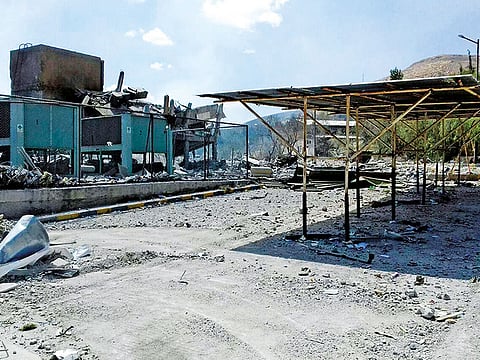World reactions to US-led strikes on Syria
Western powers said strikes were necessary to halt the use of chemical weapons

Paris: The US, France and Britain unleashed air strikes on Syria early Saturday targeting the Damascus regime in retaliation for a suspected chemical attack on civilians.
Western powers said the strikes were necessary to halt the use of chemical weapons by Bashar Al Assad.
Here is a selection of the main responses from across the world:
Russia
Damascus’s ally Moscow reacted with fury to the strikes and said it was calling an emergency session of the United Nations Security Council.
“Russia severely condemns the attack on Syria where Russian military are helping the lawful government in the fight with terrorism,” the Kremlin said in a statement.
Russia’s ambassador to the US, Anatoly Antonov, said “such actions will not be left without consequences”.
Syria
“The Syrian Arab Republic condemns in the strongest terms the brutal American-British-French aggression against Syria, which constitutes a flagrant violation of international law,” the foreign ministry said.
State news agency SANA said the attack was “doomed to fail”.
Iran
Iran, another key backer of Al Assad’s regime, warned the US and its allies were “responsible for the regional consequences of this adventurist action,” the foreign ministry said, condemning a “clear violation of international rules and laws”.
Supreme leader Ayatollah Ali Khamenei denounced US President Donald Trump, France’s Emmanuel Macron and Britain’s Theresa May as “criminals” in remarks published on his Telegram channel.
Iraq
Air strikes carried out by the United States, France and Britain against Syrian military targets could give terrorism an opportunity to expand in the region, the Iraqi foreign ministry said on Saturday.
The air strikes marked a “a very dangerous development”, the ministry said in statement.
“Such action could have dangerous consequences, threatening the security and stability of the region and giving terrorism another opportunity to expand after it was ousted from Iraq and forced into Syria to retreat to a large extent,” it said.
The ministry called on Arab leaders to discuss the situation at a summit due to be held in Saudi Arabia on Sunday.
Nato
“I support the actions taken by the United States, the United Kingdom and France ... This will reduce the regime’s ability to further attack the people of Syria with chemical weapons,” Nato Secretary General Jens Stoltenberg said in a statement.
“Nato considers the use of chemical weapons as a threat to international peace and security, and believes that it is essential to protect the Chemical Weapons Convention,” the statement added.
“This calls for a collective and effective response by the international community.”
United Nations
“I urge all member states to show restraint in these dangerous circumstances and to avoid any acts that could escalate the situation and worsen the suffering of the Syrian people,” said UN Secretary-General Antonio Guterres in a statement.
He urged the UN Security Council to agree on establishing an inquiry that would identify the perpetrators of chemical attacks.
Russia this week vetoed a US proposal to set up such a panel on the suspected attack in Syria.
Turkey
“We welcome this operation which has eased humanity’s conscience in the face of the attack in Douma, largely suspected to have been carried out by the regime,” the Turkish foreign ministry said in a statement.
It accused Damascus of carrying out “crimes against humanity and war crimes” during Syria’s seven-year civil war.
European Union
European Council President Donald Tusk said on Twitter that the European Union supported the strikes and “will stand with our allies on the side of justice”.
Germany
German chancellor Angela Merkel backed what she called a “necessary and appropriate military intervention”.
Amnesty International
“All precautions must be taken to minimise harm to civilians in any military action,” Raed Jarrar, advocacy director for the Middle East and North Africa at rights watchdog Amnesty International USA said in a statement.
Sign up for the Daily Briefing
Get the latest news and updates straight to your inbox



